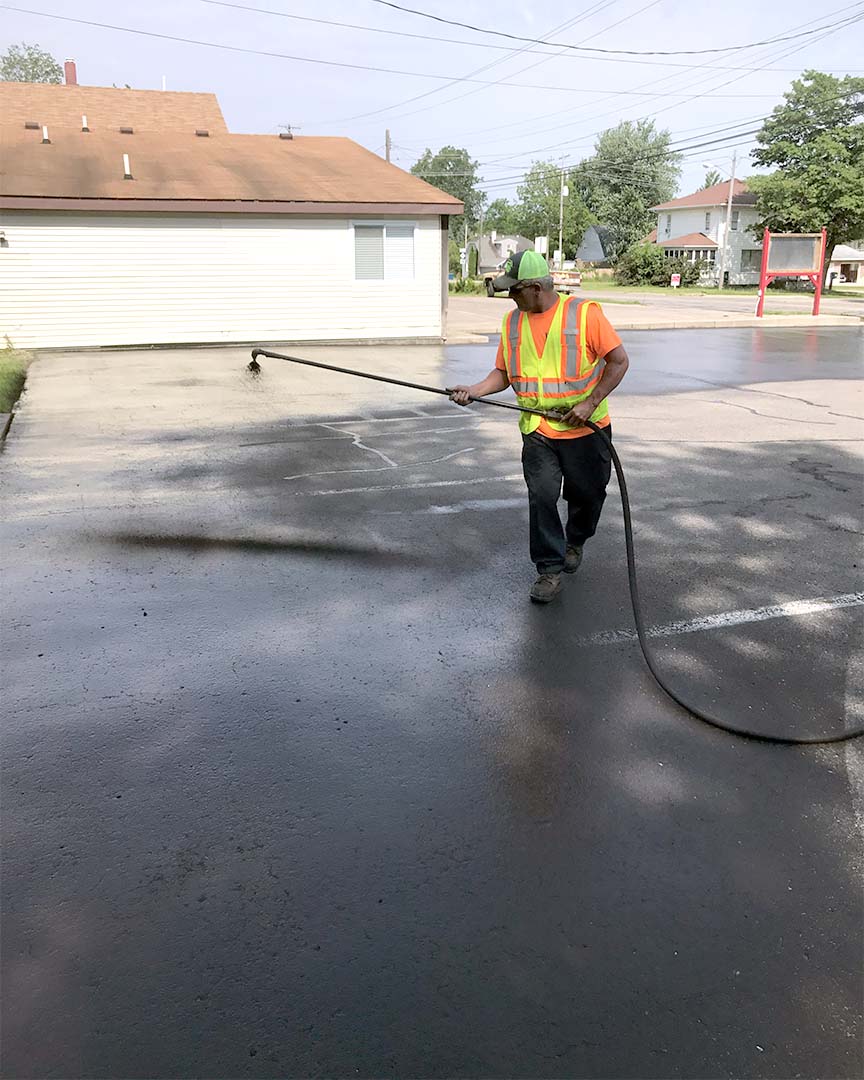Prolong Sidewalk Life-span: Ingenious Cold Mix Asphalt Sealing
Wiki Article
Cold Mix Asphalt Vs. Hot Mix Asphalt: Which Is Right for You?

Make-up Differences
Cold mix and warm mix asphalts vary considerably in their make-up, with distinct qualities that influence their efficiency and applications. Cold mix asphalt is produced by emulsifying the asphalt binder with water and an emulsifying agent prior to blending it with accumulation. This method enables for the asphalt to be convenient at reduced temperature levels, making it perfect for momentary fixings and for use in cooler weather condition problems. Hot mix asphalt, on the various other hand, is manufactured at high temperatures, normally in between 300-350 ° F, which helps to achieve much better compaction and a much more sturdy end product. The warm mix asphalt production process involves heating the aggregate and asphalt binder separately before integrating them at the asphalt plant.
In addition, cool mix asphalt often tends to be much less thick and a lot more adaptable than warm mix asphalt. This versatility makes it much better fit for areas with greater degrees of motion, such as driveways or roads with heavy traffic. In contrast, warm mix asphalt is recognized for its high durability and resistance to rutting and cracking, making it a recommended selection for freeways and high-traffic roads where longevity is critical.
Installment Process Variances
The procedure of installing chilly mix and warm mix asphalt shows notable variations in their treatments and requirements. In comparison, warm mix asphalt demands a more fancy installment procedure. Due to the heating requirements, hot mix asphalt setups are commonly carried out by professionals with specific devices, guaranteeing an extra long-term and structurally audio result.Longevity and Long Life Variables
When thinking about asphalt choices, sturdiness and durability are important elements to assess for long lasting pavement performance,. Warm mix asphalt (HMA) is recognized for its phenomenal longevity and long life. The high temperature levels during the laying and mixing procedure enable much better compaction, resulting in a denser and more powerful sidewalk structure. This leads to HMA being more immune to heavy traffic loads, rough weather, and the effects of maturing contrasted to cold mix asphalt (CMA)
In terms of long life, HMA usually outperforms CMA as a result of its exceptional strength and resistance residential or commercial properties. HMA sidewalks have a longer you could try this out service life, calling for less regular repairs and upkeep, which can translate to set you back savings in the future. Furthermore, HMA sidewalks are a lot more easily adjustable to meet certain task demands, better enhancing their durability.
Expense Factors To Consider
Taking into consideration the monetary ramifications is a critical aspect when assessing the choice between hot mix asphalt (HMA) and cold mix asphalt (CMA) for pavement projects. While the initial cost of warm mix asphalt is normally greater than that of chilly mix asphalt, HMA typically offers a more affordable solution in the lengthy run due to its premium longevity and durability.In enhancement to material expenses, it's essential to think about the expenses connected with installment and maintenance when comparing HMA and CMA. Inevitably, the decision in between HMA and CMA should take into account not simply the first cost yet also the lasting financial ramifications to identify the most affordable option for the specific pavement task.
Environmental Impact Contrast
Comparison of the ecological impacts between hot mix asphalt (HMA) and chilly mix asphalt (CMA) reveals unique distinctions in sustainability techniques. HMA manufacturing requires heats, causing raised energy consumption and greenhouse gas discharges. The procedure additionally launches unpredictable natural compounds (VOCs) and hazardous air contaminants (HAPs) into the environment. In comparison, CMA is generated and used at reduced temperature levels, lowering power usage and emissions considerably. The lower production temperatures of CMA lead to find more reduced fuel consumption and lower levels of CO2 emissions, making it a more environmentally friendly alternative.Furthermore, making use of CMA frequently involves recycling existing asphalt sidewalk, advertising resource conservation and lowering the quantity of waste sent out to landfills. This recycling facet better boosts the sustainability of CMA compared to HMA. On the whole, when considering the ecological influence, CMA emerges as a more environmentally lasting option due to its reduced energy requirements, lowered discharges, and the capacity for reusing existing products. By going with CMA over HMA, roadway building projects can add positively to ecological preservation efforts.
Final Thought
To conclude, the choice between cool mix asphalt (CMA) and hot mix asphalt (HMA) depends upon different factors such as structure, setup procedure, resilience, long life, price, and environmental effect. asphalt repair. While CMA provides a cost-effective and quick service for small fixings, HMA ensures exceptional sturdiness and long life for hefty website traffic areas. Consider these elements very carefully to figure out which More hints sort of asphalt is the appropriate choice for your paving needs

Thinking about the economic implications is a critical aspect when examining the selection between hot mix asphalt (HMA) and cool mix asphalt (CMA) for sidewalk projects. While the preliminary price of warm mix asphalt is generally greater than that of cool mix asphalt, HMA often supplies an extra cost-efficient solution in the long run due to its remarkable longevity and longevity. angle parking.Comparison of the ecological influences in between warm mix asphalt (HMA) and cool mix asphalt (CMA) reveals distinct differences in sustainability practices.In conclusion, the option between chilly mix asphalt (CMA) and hot mix asphalt (HMA) depends on different aspects such as structure, installment procedure, toughness, long life, price, and ecological influence
Report this wiki page